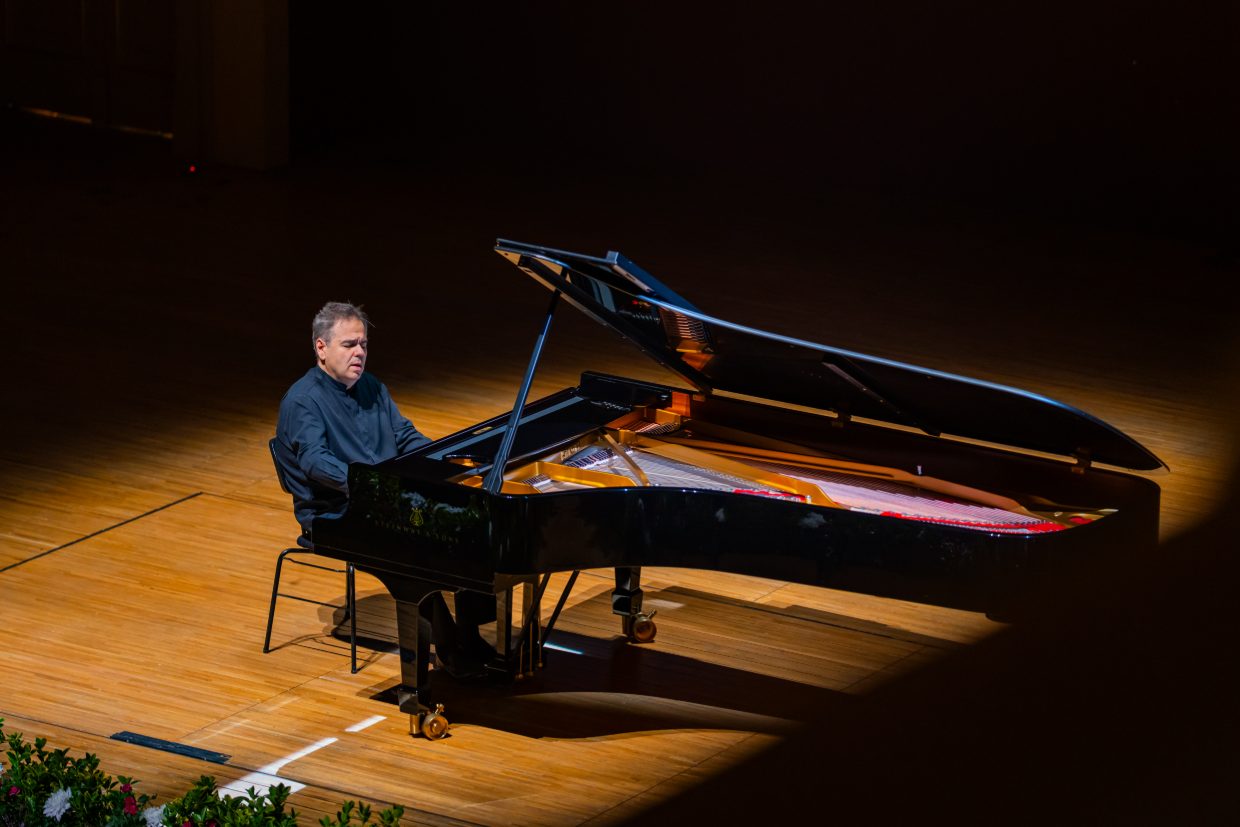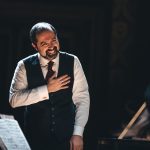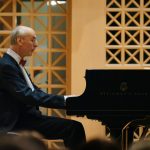by Michal Rezek
For many lovers of the piano, the very name Arcadi Volodos dilates the pupils and sharpens the senses in anticipation of what is to come. Prague audiences had the good fortune to hear this piano virtuoso at the closing concert of the Rudolf Firkušný Piano Festival, organised annually by the Prague Spring Festival. The performance took place on 13 November 2025 in a fully packed Dvořák Hall of the Rudolfinum.
Volodos Cannot Be Imitated
As Volodos stepped into the small pool of light surrounding the instrument, I was instantly reminded of Sviatoslav Richter’s late concerts, illuminated only by a small lamp on the music stand – an effect that concentrated attention intensely on the performer and his immediate space. The enthusiastic applause that greeted him testified to the audience’s awareness of his pianistic wizardry and the impatience with which his appearance was awaited. His youthful feats of virtuosity still haunt younger generations of listeners and pianists alike. The reason is simple: his technique lies far beyond what is usually considered achievable or even comprehensible. Just as the pianistic world spent decades unsuccessfully trying to replicate the legendary technique of György Cziffra, the past thirty years have brought a similar lack of success in attempts to emulate the fifty-three-year-old Volodos. His playing is marked by extraordinary agility, immense physical reserves enabling the highest dynamic peaks, and octave and chordal passages executed at blistering speeds. Naturally, the audience expected to witness these qualities live – and many were also curious to see how his interpretative approach has evolved, for he now belongs firmly among mature artists.
The first half of the concert was devoted entirely to Schubert’s Sonata in A major, D 959. This expansive, four-movement work demands from its interpreter absolute control of sound, tempo, long melodic arches, pedalling, and overall architecture. The balance and interplay of these parameters are essential for a convincing interpretation. In the opening four solemn bars, Volodos produced an immense orchestral sonority and demonstrated the sheer strength of his fingers – enough for the impeccably prepared instrument to show signs of strain almost immediately. Sitting on a simple low chair, often leaning back, he projected an air of complete ease and comfort.
Yet almost everything I wrote above – except for the sonic attributes – proved irrelevant. The profusion of tempo fluctuations, extended pauses, and utterly unrestrained rubato created the impression of a fantasy-like creation, marked by strong improvisatory impulses. The formal architecture, as a matter of course, could not satisfy conventional expectations, and in almost any other case one would have been justified in rejecting such an approach.
Throughout, I thought to myself that one simply cannot construct a major sonata in such a fragmented, episodic manner. This type of eccentric musical perception rarely convinces me; it did not with great pianists such as Tzimon Barto or Kemal Gekić, whose highly individual approaches ultimately failed to win me over. But Volodos is Volodos – and no one lesser. His aim is not to shock. This is genuinely how he feels the music. Combined with his supreme musicality, everything suddenly shifts into another realm. He plays freely and lightly; one senses his joy and enthusiasm. Every hesitation, every suspension is experienced with immense intensity. The impression is one of complete liberation and naturalness. Should anyone object, he might well say: “I can’t help it—this is how I feel the music.” The mixture of dream-like, whisper-soft textures in near-static tempos with the propulsive drive of the more active passages created something profoundly sincere and unexpectedly transparent – as if this were simply the way the music had always wished to exist.
I was persuaded, although I had to reflect deeply on how this reversal of opinion had come about. Volodos cannot be imitated pianistically; he cannot be imitated musically or interpretatively. This is his great strength. The largely young audience responded with spontaneous enthusiasm. Yes – the coming generation of pianists will play differently: more freely, more openly than we did. This is natural development and, indeed, as it should be. Let us regard Volodos as a kind of visionary, offering such interpretative possibilities at their finest – much as the uniquely original Glenn Gould once did.
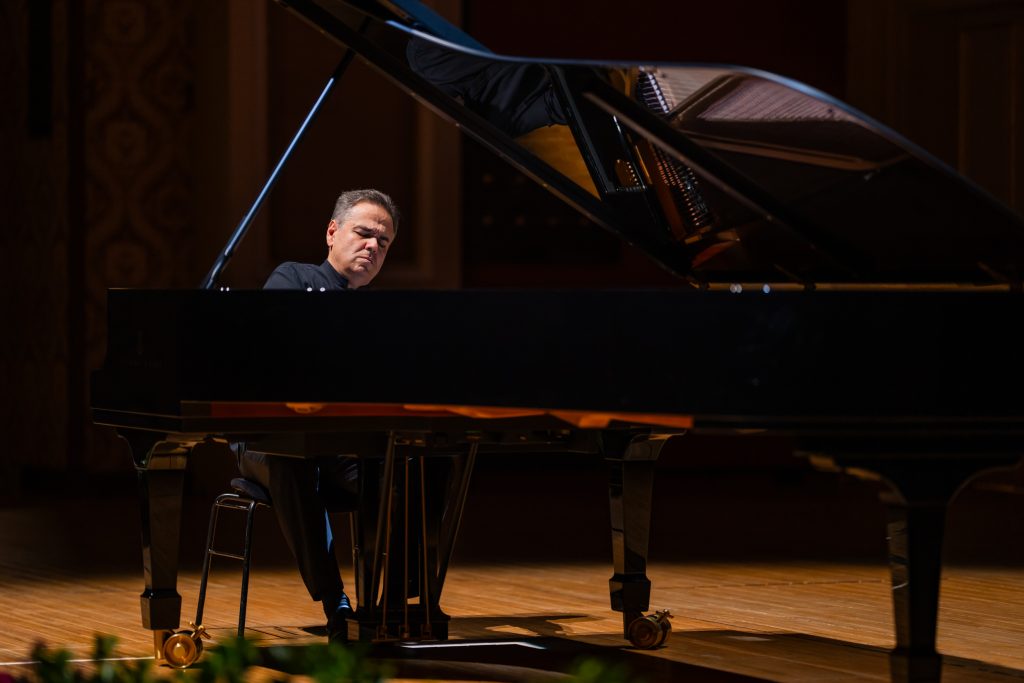
An Explosion of Enthusiasm
In the second half, Volodos performed Schumann’s complete cycle Davidsbündlertänze, Op. 6. Here he revealed himself as a master of miniature forms and of mercurial changes in mood and character. His playing was immensely vivid and once again completely unrestrained; the quick movements were taken at staggering virtuosic tempos, yet he also displayed a fine sense for Schumannesque humour and subtle irony. Schumann’s music is extraordinarily rich and varied, and Volodos exploited this abundance to its fullest. I would never have imagined voluntarily listening to the entire cycle in place of the Symphonic Etudes or Kreisleriana. Yet Volodos – one of the very few – can offer this early cycle as a fully worthy alternative. For me, this was the musical summit of the entire evening.
The final programmed work was Liszt’s Hungarian Rhapsody No. 13 in A minor. Audiences understandably await this sort of repertoire from Volodos with particular impatience. The music is inherently free, expressive, and invites personal creativity. Listeners have become accustomed to Volodos’s arrangements, in which the original material often serves merely as thematic foundation for versions that are technically more demanding and, in many cases, musically more compelling. So it was here. We were curious: had age diminished any of his astonishing acrobatic power? Could he still unleash that whirlwind and volcanic eruption of sound which we rightly admire in him? He did not disappoint. Everything was as expected. The audience watched in fascination and amazement at what unfolded onstage—seemingly impossible, unbelievable, yet for the artist’s hands utterly natural. The explosion of enthusiasm that followed was entirely spontaneous.
He then offered five encores in quick succession: Brahms’s serene Intermezzo in E-flat major, Op. 117 No. 1; Schubert’s Moments musicaux No. 3 in F minor; Mompou’s delicately Spanish Pájaro triste; Ernesto Lecuona’s radiant Malagueña; and finally, a calming Bach Siciliano from the Concerto in D minor, BWV 596. Only then did the delighted audience allow him to leave the stage. For most listeners, it must have been an unforgettable evening.
Speaking with Volodos after the concert, one would never guess he had just played such a demanding programme. He was calm, balanced, sincere, and as modest as onstage. We should value deeply that he accepted the invitation to the Firkušný Festival – he performs very few concerts – and I firmly believe he will find his way back to Prague again before long.
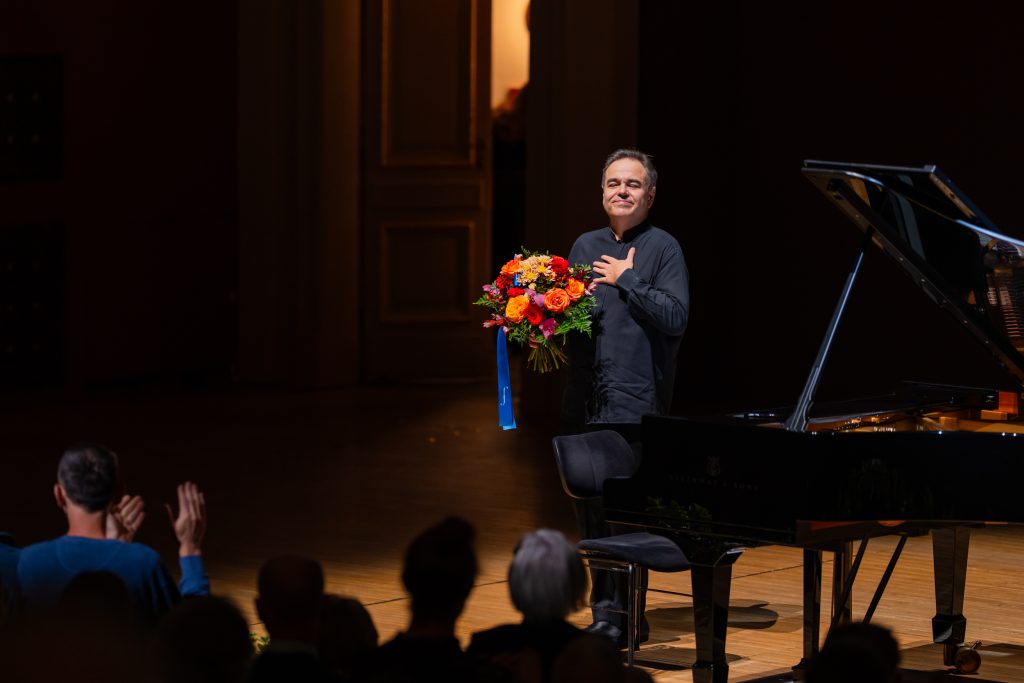
Rudolf Firkušný Piano Festival: Arcadi Volodos
13 November 2025, 7:30 p.m.
Rudolfinum, Dvořák Hall
Programme
Franz Schubert: Sonata in A major, D 959
Robert Schumann: Davidsbündlertänze, Op. 6
Franz Liszt: Hungarian Rhapsody No. 13 in A minor, S 244/13 (arr. A. Volodos)
Johannes Brahms: Intermezzo in E-flat major, Op. 117 No. 1 (Three Intermezzos)
Franz Schubert: Moments musicaux No. 3 in F minor, Op. 94, D 780
Federico Mompou: Pájaro triste (1914) from 5 Impresiones íntimas
Ernesto Lecuona: Malagueña
Antonio Vivaldi (arr. J. S. Bach): Siciliano, BWV 596
Performer
Arcadi Volodos – piano


